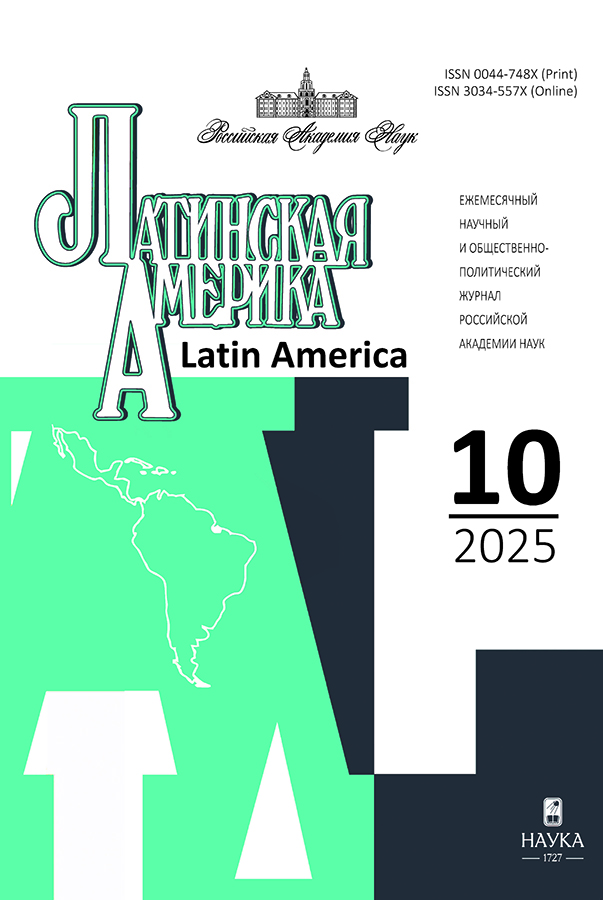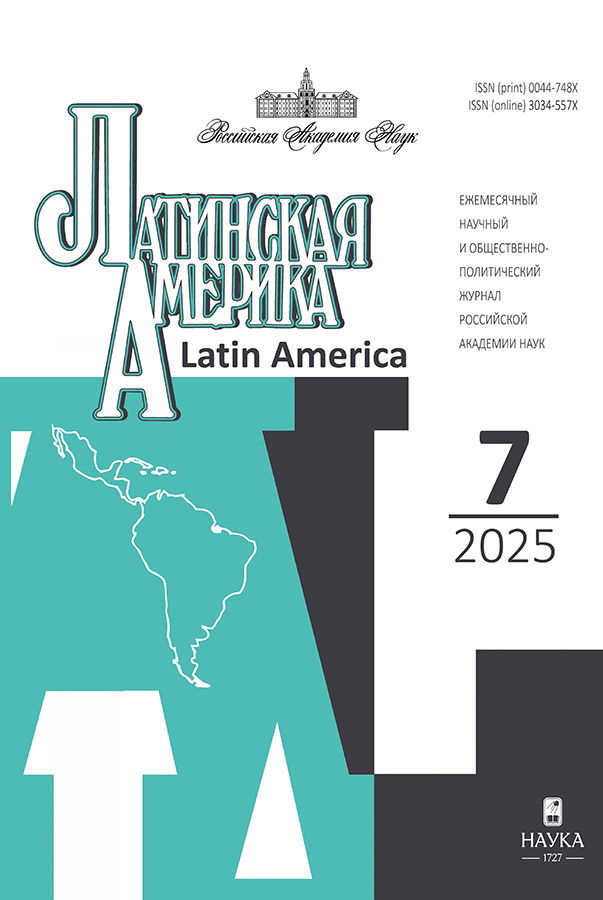№ 7 (2025)
Прямая речь
 6-14
6-14


Политика
Властные структуры и политические процессы на Кубе: неустойчивая стабильность
Аннотация
В статье анализируются политические реформы, зафиксированные в Конституции 2019 г. Особое внимание уделяется функциям властных структур, их кадровому составу и деятельности основных субъектов политики. Кризисная социальноэкономическая ситуация, сложившаяся на Кубе, привела к массовым социальным протестам в июле 2021 г. и последующим выступлениям населения. Относительная стабилизация достигнута в результате диалога между властными структурами и обществом и точечного решения накопившихся проблем, с одной стороны, и жесткого подавления протестов ― с другой, а также из-за массовой эмиграции противников режима. Дальнейшая стабилизация будет зависеть от способности правительства найти баланс между социальной справедливостью и эффективностью экономики. Выходу из системного кризиса могут способствовать отмена или ослабление санкций со стороны США и существенное увеличение внешней помощи. В случае нерешенности существующих проблем нельзя полностью исключить вероятность активизации протестных акций и социального взрыва.
Латинская Америка. 2025;(7):15-34
 15-34
15-34


«Майяское возрождение» и этнический фактор в электоральной политике современной Мексики
Аннотация
Проблема электоральной мобилизации коренных народов Латинской Америки по-прежнему актуальна с точки зрения проведения политических, культурных и антропологических исследований. В связи с развитием политических движений латиноамериканских индейцев представляется целесообразным рассмотреть проект юкатанского политика Хоакина Диаса Мены «Майяское возрождение», который помог ему получить пост губернатора штата Юкатан на выборах 2024 г. В статье рассмотрены роль политического майянизма в предвыборной риторике Х. Диаса Мены, а также влияние майянизма на результаты выборов.
Латинская Америка. 2025;(7):35-45
 35-45
35-45


Экономика
Продовольственная безопасность малых островных государств Карибского бассейна
Аннотация
В статье анализируется проблематика обеспечения продовольственной безопасности малых островных развивающихся государств Карибского бассейна. Несмотря на достижение определенного прогресса в деле уменьшении количества голодающих и развития собственного потенциала обеспечения населения продовольствием, ситуация в субрегионе остается нестабильной. Выявлены проблемы, с которыми сталкиваются малые островные развивающиеся государства, внутренние и внешние факторы, влияющие на продовольственную безопасность, определены основные угрозы, тормозящие прогресс в этой области. Рассмотрены направления международного сотрудничества по искоренению голода и недоедания в странах субрегиона.
Латинская Америка. 2025;(7):46-60
 46-60
46-60


Особенности развития водородных технологий в странах Латинской Америки и Карибского бассейна
Аннотация
В работе проанализированы возможности применения водородных технологий в странах Латинской Америки и Карибского бассейна. Региональными лидерами в этой сфере являются Чили и Бразилия, открытые для международного сотрудничества с активным участием государства в осуществлении водородных проектов, в том числе исследовательских. Возможности применения водородных технологий крайне ограничены и не выходят за рамки традиционных отраслей (химической). Специализация региона на производстве так называемого зеленого водорода может стать дополнительным стимулом для привлечения инвестиций и развития собственных отраслей экономики.
Латинская Америка. 2025;(7):61-79
 61-79
61-79


Общество XXI века
Особенности цифровой дипломатии стран Латинской Америки в эпоху глобальной турбулентности
Аннотация
В последние годы публичная дипломатия стран Латинской Америки претерпевает значительную трансформацию, основанную на применении цифровых технологий как инструмента «мягкой силы». Цифровая дипломатия включает в себя использование социальных медиа, онлайн-платформ и виртуальные встречи для продвижения национальных интересов. На протяжении последних 15 лет президенты латиноамериканских государств активно применяют этот инструмент публичной дипломатии для связи с целевыми аудиториями по всему миру. В большинстве стран Латинской Америки продвигается Twitter-дипломатия для повышения эффективности публичной дипломатии и вовлеченности в нее граждан посредством публикации твитов политическими деятелями или ведомствами в целях распространения информации о своей внешней политике. Это позволяет не только информировать международное сообщество, но и взаимодействовать с гражданами, что повышает уровень прозрачности и подотчетности властей. Однако в работе дипломатических ведомств не используются технологии искусственного интеллекта (чат-боты, цифровые консультанты и др.). Кроме того, в регионе фиксируется несанкционированное применение технологий генеративного искусственного интеллекта в информационно-психологических операциях. Все это препятствует развитию эффективной дипломатии.
Латинская Америка. 2025;(7):80-94
 80-94
80-94


Международные связи
Деятельность Агентства США по международному развитию в Латинской Америке
Аннотация
В статье рассматривается деятельность Агентства США по международному развитию в Латино-Карибской Америке за последние три десятилетия. На основе анализа базы данных инициатив агентства авторы разделили все проекты, реализуемые этой организацией в регионе, на две группы ― политические и социальногуманитарные. Выдвинута и подтверждена гипотеза о том, что основными направлениями деятельности агентства являлись содействие политическим изменениям в странах ЛКА в интересах Вашингтона, а также помощь правительствам в противодействии комплексным угрозам, затрагивающим безопасность Соединенных Штатов. Используя метод case-study, продемонстрированы противоречия и двойные стандарты работы агентства в латиноамериканских государствах.
Латинская Америка. 2025;(7):95-110
 95-110
95-110












